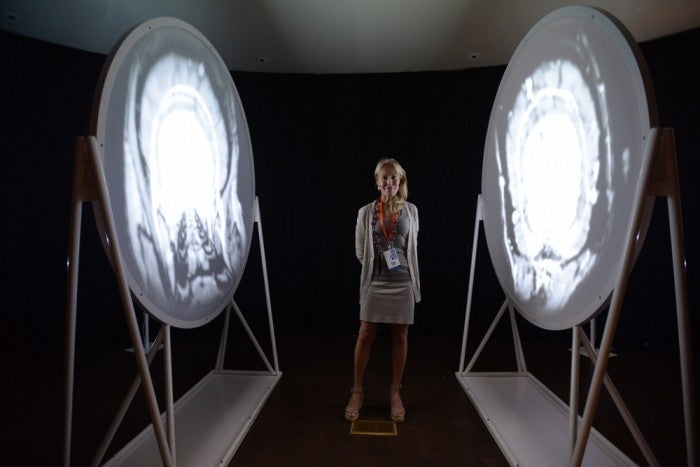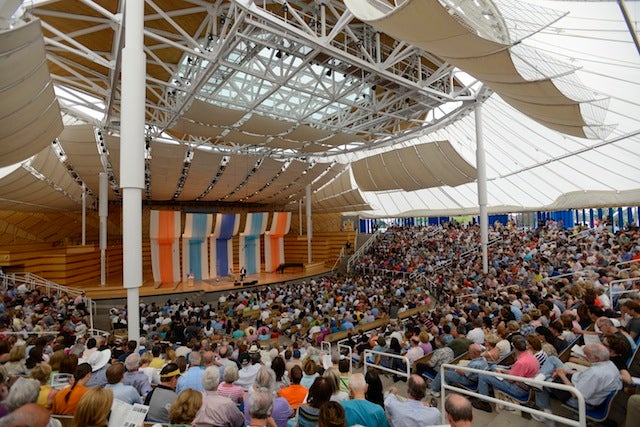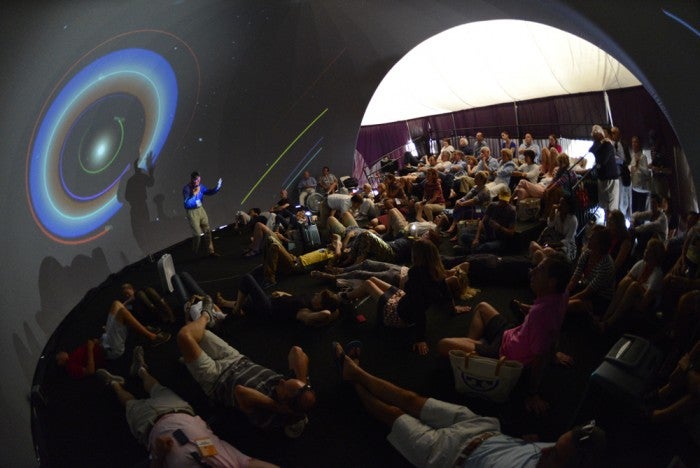
Artist Paula Crown exhibited “Inside My Head: A Contemporary Self-Portrait” based on her own brain scans at the 2013 Aspen Ideas Festival. Photo by Daniel Bayer.
The 2013 Aspen Ideas Festival was by far the largest festival yet and, in 2014, it will get even larger. The festival will go from seven to 10 days filled with some of the best thinkers, leaders, artists, and activists offering their most innovative ideas for moving the world forward with the addition of a two and a half-day forum focused entirely on health called Spotlight: Health. Tickets are on sale to the general public now.
 This past year, 350 speakers on more than 250 panels convened to represent fields such as politics, science, the arts, economy, education, and more. Since the Festival’s inception nine years ago, the emphasis on not just thinking, but doing, has grown — making this year’s event the best example thus far of what’s possible when you apply the right mix of people and ideas to some of the toughest questions we face.
This past year, 350 speakers on more than 250 panels convened to represent fields such as politics, science, the arts, economy, education, and more. Since the Festival’s inception nine years ago, the emphasis on not just thinking, but doing, has grown — making this year’s event the best example thus far of what’s possible when you apply the right mix of people and ideas to some of the toughest questions we face.
The Aspen Meadows campus saw an unprecedented amount of innovation demonstrated this past summer — a self-righting motorcycle, digital educational tools, an MRI-based art exhibit, even a full-fledged planetarium. But it was about much more than innovative objects. Here, then, are just a few Festival moments that reflect how all these doers are propelling the world forward in a multitude of areas and we hope you, too, are inspired to join us at the 2014 festival.
BEYOND THE BUDGET CRISIS
In a sweeping conversation that ranged from economic recovery to immigration reform, US Treasury Secretary Jacob Lew (pictured right) discussed, with some foresight, the far-reaching consequences of sequestration. (Watch the video. Read or download the transcript.) He explained that it was first put forth as “something so unattractive that it would motivate Congress to enact a balanced set of spending cuts and revenue increases.” But with that strategy backfiring, Lew noted, “there is a stunning lack of imagination to understand the impact of the effects of sequestration.”
Cutbacks on education, infrastructure, and research and development would have long-term economic impacts, he said, adding a more dire warning about military cuts (which came into play in the Syria debate). While “these things aren’t free,” Lew suggested that some of the affected areas are ones that historically have bipartisan support, or that, at least, don’t require “the kind of arm wrestling where one side has to win and the other side has to lose.”
The challenge, he said, is to shift from the debt debate to “what do we need to do to build the foundation for a strong economy in the generation to come? How do we have alternative policies to do deficit reduction and make room for investments that will keep America on the cutting-edge in the next generation? … The macroeconomic effect is very real,” he concluded, “and it would be a good thing for this country if we took our own advice and got the fiscal consolidation a little bit into the future, with the kind of structural reforms that build long-term confidence.”
A WHOLE NEW LAUNCH FOR SPACE
A program track called Flying Cars? The Future of Transportation highlighted innovations such as driverless cars, self-righting motorcycles, alternative fuels, car and bike share programs, and — yes — flying cars.

Virgin Galactic’s Stephen Attenborough explained that while Virgin Galactic’s original goal was to build a spaceship and offer commercial spaceflight, it has become something bigger. The company will launch satellites, offer research flights, and is working toward point-to-point flights that will move people around the globe at six times the speed of the Concord. The desire to go beyond the Earth’s atmosphere is not simply a selfish one, Branson explained: “We’re just this little pinprick, and space is infinite. Everyone who has been to space has been changed — they’ve come back having looked back at the Earth wanting to do something positive about it.”
The upcoming festival will feature topics that build on ongoing discussions like the budget crisis and, of course, open doors to new conversations as innovations evolve. Register here.

